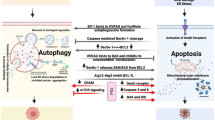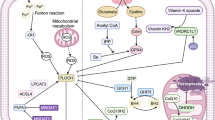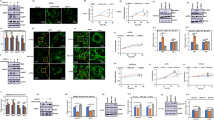Abstract
Objective
To investigate the effects of curcumin on release of cytochrome c and expressions of Bcl-2, Bax, Bad, Bcl-xL, caspase-3, poly ADP-ribose polymerase (PARP), and survivin of HT-29 cells. Methods: HT-29 cells were treated with curcumin (0∼80 μmol/L) for 24 h. The release of cytochrome c from the mitochondria and the apoptosis-related proteins Bax, Bcl-2, Bcl-xL, Bad, caspase-3, PARP, and survivin were determined by Western blot analysis and their mRNA expressions by reverse transcriptase-polymerase chain reaction (RT-PCR).
Results
Curcumin significantly induced the growth inhibition and apoptosis of HT-29 cells. A decrease in expressions of Bcl-2, Bcl-xL and survivin was observed after exposure to 10∼80 μmol/L curcumin, while the levels of Bax and Bad increased in the curcumin-treated cells. Curcumin also induced the release of cytochrome c, the activation of caspase-3, and the cleavage of PARP in a dose-dependent manner.
Conclusion
These data suggest that curcumin induced the HT-29 cell apoptosis possibly via the mitochondria-mediated pathway.
Similar content being viewed by others
References
Aggarwal, S., Ichikawa, H., Takada, Y., Sandur, S.K., Shishodia, S., Aggarwal, B.B., 2006. Curcumin (diferuloylmethane) down-regulates expression of cell proliferation and antiapoptotic and metastatic gene products through suppression of IκBα kinase and Akt activation. Mol. Pharmacol., 69(1):195–206. [doi:10.1124/mol.105.017400]
Bae, J.H., Park, J.W., Kwon, T.K., 2003. Ruthenium red, inhibitor of mitochondrial Ca2+ uniporter, inhibits curcumin induced apoptosis via the prevention of intracellular Ca2+ depletion and cytochrome c release. Biochem. Biophys. Res. Commun., 303(4):1073–1079. [doi:10.1016/S0006-291X(03)00479-0]
Bhaumik, S., Jyothi, M.D., Khar, A., 2000. Differential modulation of nitric oxide production by curcumin in host macrophages and NK cells. FEBS Lett., 483(1):78–82. [doi:10.1016/S0014-5793(00)02089-5]
Cao, J., Liu, Y., Jia, L., Zhou, H.M., Kong, Y., Yang, G., Jiang, L.P., Li, Q.J., Zhong, L.F., 2007. Curcumin induces apoptosis through mitochondrial hyperpolarization and mtDNA damage in human hepatoma G2 cells. Free Radic. Biol. Med., 43(6):968–975. [doi:10.1016/j.freeradbiomed.2007.06.006]
Chadalapaka, G., Jutooru, I., Chintharlapalli, S., Papineni, S., Smith, R., Li, X., Safe, S., 2008. Curcumin decreases specificity protein expression in bladder cancer cells. Cancer Res., 68(13):5345–5354. [doi:10.1158/0008-5472.CAN-07-6805]
Chen, C.Y., Liu, T.Z., Liu, Y.W., Tseng, W.C., Liu, R.H., Lu, F.J., Lin, Y.S., Chen, C.H., 2007. 6-Shogaol (alkanone from Ginger) induces apoptotic cell death of human hepatoma p53 mutant Mahlavu subline via an oxidative stress-mediated caspase-dependent mechanism. J. Agric. Food Chem., 55(3):948–954. [doi:10.1021/jf0624594]
Chen, J.H., Cao, J.L., Chu, Y.L., Wang, Z.L., Yang, Z.T., Wang, H.L., 2008. T-2 toxin-induced apoptosis involving Fas, p53, Bcl-xL, Bcl-2, Bax and caspase-3 signaling pathways in human chondrocytes. J. Zhejiang Univ. Sci. B, 9(6):455–463. [doi:10.1631/jzus.B0820013]
Cory, S., Adams, J.M., 2002. The Bcl-2 family: regulators of the cellular life-or-death switch. Nat. Rev. Cancer, 2(9):647–656. [doi:10.1038/nrc883]
Desai, B.N., Myers, B.R., Schreiber, S.L., 2002. FKBP12-rapamycin-associated protein associates with mitochondria and senses osmotic stress via mitochondrial dysfunction. Proc. Natl. Acad. Sci. USA, 99(7):4319–4324. [doi:10.1073/pnas.261702698]
Gao, X., Kuo, J., Jiang, H., Deeb, D., Liu, Y., Divine, G., Chapman, R.A., Dulchavsky, S.A., Gautam, S.C., 2004. Immunomodulatory activity of curcumin: suppression of lymphocyte proliferation, development of cell-mediated cytotoxicity, and cytokine production in vitro. Biochem. Pharmacol., 68(1):51–61. [doi:10.1016/j.bcp.2004.03.015]
Green, D.R., 2000. Apoptotic pathways: paper wraps stone blunts scissors. Cell, 102(1):1–4. [doi:10.1016/S0092-8674(00)00003-9]
Grishko, V., Rachek, L., Musiyenko, S., Ledoux, S.P., Wilson, G.L., 2005. Involvement of mtDNA damage in free fatty acid-induced apoptosis. Free Radic. Biol. Med., 38(6):755–762. [doi:10.1016/j.freeradbiomed.2004.11.023]
Khor, T.O., Gul, Y.A., Ithnin, H., Seow, H.F., 2006. A comparative study of the expression of Wnt-1, WISP-1, survivin and cyclin-D1 in colorectal carcinoma. Int. J. Colorectal Dis., 21(4):291–300. [doi:10.1007/s00384-005-0002-8]
Kluck, R.M., Bossy-Wetzel, E., Green, D.R., Newmeyer, D.D., 1997. The release of cytochrome c from mitochondria: a primary site for Bcl-2 regulation of apoptosis. Science, 275(5303):1132–1136. [doi:10.1126/science.275.5303.1132]
Lam, A.K., Saleh, S., Smith, R.A., Ho, Y., 2008. Quantitative analysis of survivin in colorectal adenocarcinoma: increased expression and correlation with telomerase activity. Human Pathol., 39(8):1229–1233. [doi:10.1016/j.humpath.2008.01.001]
Li, F., Brattain, M.G., 2006. Role of the survivin gene in pathophysiology. Am. J. Pathol., 169(1):1–10. [doi:10.2353/ajpath.2006.060121]
Li, P., Nijhawan, D., Budihardjo, I., Srinivasula, S.M., Ahmad, M., Alnemri, E.S., Wang, X., 1997. Cytochrome c and dATP-dependent formation of Apaf-1/caspase-9 complex initiates an apoptotic protease cascade. Cell, 91(4):479–489. [doi:10.1016/S0092-8674(00)80434-1]
Moiseeva, E.P., Almeida, G.M., Jones, G.D.D., Manson, M.M., 2007. Extended treatment with physiologic concentrations of dietary phytochemicals results in altered gene expression, reduced growth, and apoptosis of cancer cells. Mol. Cancer Ther., 6(11):3071–3079. [doi:10.1158/1535-7163.MCT-07-0117]
Newman, D.J., Cragg, G.M., Snader, K.M., 2003. Natural products as sources of new drugs over the period 1981–2002. J. Nat. Prod., 66(7):1022–1037. [doi:10. 1021/np030096l]
Pan, M.H., Chang, W.L., Lin-Shiau, S.Y., Ho, C.T., Lin, J.K., 2001. Induction of apoptosis by garcinol and curcumin through cytochrome c release and activation of caspases in human leukemia HL-60 cells. J. Agric. Food Chem., 49(3):1464–1474. [doi:10.1021/jf001129v]
Piwocka, K., Zabłocki, K., Wieckowski, M.R., Skierski, J., Feiga, I., Szopa, J., Drela, N., Wojtczak, L., Sikora, E., 1999. A novel apoptosis-like pathway, independent of mitochondria and caspases, induced by curcumin in human lymphoblastoid T (Jurkat) cells. Exp. Cell Res., 249(2):299–307. [doi:10.1006/excr.1999.4480]
Porn-Ares, M.I., Chow, S.C., Slotte, J.P., Orrenius, S., 1997. Induction of apoptosis and potentiation of TNF and Fas-mediated apoptosis in U937 cells by the xanthogenate compound D609. Exp. Cell Res., 235(1):48–54. [doi:10.1006/excr.1997.3641]
Rashmi, R., Santhosh Kumar, T.R., Karunagaran, D., 2003. Human colon cancer cells differ in their sensitivity to curcumin-induced apoptosis and heat shock protects them by inhibiting the release of apoptosis-inducing factor and caspases. FEBS Lett., 538(1–3):19–24. [doi:10.1016/S0014-5793(03)00099-1]
Reed, J.C., 1998. Bcl-2 family proteins. Oncogene, 17(25):3225–3236. [doi:10.1038/sj.onc.1202591]
Salvioli, S., Ardizzoni, A., Franceschi, C., Cossarizza, A., 1997. JC-1, but not DiOC6(3) or rhodamine 123, is a reliable fluorescent probe to assess Δϕ changes in intact cells: implications for studies on mitochondrial functionality during apoptosis. FEBS Lett., 411(1):77–82. [doi:10.1016/S0014-5793(97)00669-8]
Scott, D.W., Loo, G., 2004. Curcumin-induced GADD153 gene up-regulation in human colon cancer cells. Carcinogenesis, 25(11):2155–2164. [doi:10.1093/carcin/ bgh239]
Sen, S., Sharma, H., Singh, N., 2005. Curcumin enhances Vinorelbine-mediated apoptosis in NSCLC cells by the mitochondrial pathway. Biochem. Biophys. Res. Commun., 331(4):1245–1252. [doi:10.1016/j.bbrc.2005.04. 044]
Shang, T., Joseph, J., Hillard, C.J., Kalyanaraman, B., 2005. Death-associated protein kinase as a sensor of mitochondrial membrane potential: role of lysosome in mitochondrial toxin-induced cell death. J. Biol. Chem., 280(41):34644–34653. [doi:10.1074/jbc.M506466200]
Sharma, R.A., Gescher, A.J., Steward, W.P., 2005. Curcumin: the story so far. Eur. J. Cancer, 41(13):1955–1968. [doi:10.1016/j.ejca.2005.05.009]
Shi, M., Cai, Q., Yao, L., Mao, Y., Ming, Y., Ouyang, G., 2006. Antiproliferation and apoptosis induced by curcumin in human ovarian cancer cells. Cell Biol. Internat., 30(3):221–226. [doi:10.1016/j.cellbi.2005.10.024]
Shishodia, S., Amin, H.M., Lai, R., Aggarwal, B.B., 2005a. Curcumin (diferuloylmethane) inhibits constitutive NF-κB activation, induces G1/S arrest, suppresses proliferation, and induces apoptosis in mantle cell lymphoma. Biochem. Pharmacol., 70(5):700–713. [doi:10. 1016/j.bcp.2005.04.043]
Shishodia, S., Sethi, G., Aggarwal, B.B., 2005b. Curcumin: getting back to the roots. Ann. N. Y. Acad. Sci., 1056(1):206–217. [doi:10.1196/annals.1352.010]
Song, G., Mao, Y.B., Cai, Q.F., Yao, L.M., Ouyang, G.L., Bao, D., 2005. Curcumin induces human HT-29 colon adenocarcinoma cell apoptosis by activating p53 and regulating apoptosis-related protein expression. Braz. J. Med. Biol. Res., 38(12):1791–1798. [doi:10.1590/S0100-879X2005001200007]
Suzuki, A., Ito, T., Hayashida, M., Hayasaki, Y., Tuutomi, Y., Akahane, K., Nakano, T., Miura, M., Shiraki, K., 2000. Survivin initiates procaspase-3/p21 complex formation as a result of interaction with Cdk4 to resist Fas-mediated cell death. Oncogene, 19(10):1346–1353. [doi:10.1038/ sj.onc.1203429]
Tan, H.Y., Liu, J., Wu, S.M., Luo, H.S., 2005. Expression of a novel apoptosis inhibitor-survivin in colorectal carcinoma. World J. Gastroenterol., 11(30):4689–4692.
Wang, X., 2001. The expanding role of mitochondria in apoptosis. Genes Dev., 15(22):2922–2933.
Watson, A.J.M., 2006. An overview of apoptosis and the prevention of colorectal cancer. Crit. Rev. Oncol. Hematol., 57(2):107–121. [doi:10.1016/j.critrevonc.2005.06. 005]
Woo, J.H., Kim, Y.H., Choi, Y.J., Kim, D.G., Lee, K.S., Bae, J.H., Mindo, S., Chang, J.S., Jeong, Y.J., Lee, Y.H., et al., 2003. Molecular mechanisms of curcumin-induced cytotoxicity: induction of apoptosis through generation of reactive oxygen species, down-regulation of Bcl-xL and IAP, the release of cytochrome c and inhibition of Akt. Carcinogenesis, 24(7):1199–1208. [doi:10.1093/carcin/ bgg082]
Author information
Authors and Affiliations
Corresponding author
Additional information
Project (No. 2006C12098) supported by the Science and Technology Department of Zhejiang Province, China
Rights and permissions
About this article
Cite this article
Wang, Jb., Qi, Ll., Zheng, Sd. et al. Curcumin induces apoptosis through the mitochondria-mediated apoptotic pathway in HT-29 cells. J. Zhejiang Univ. Sci. B 10, 93–102 (2009). https://doi.org/10.1631/jzus.B0820238
Received:
Accepted:
Published:
Issue Date:
DOI: https://doi.org/10.1631/jzus.B0820238




